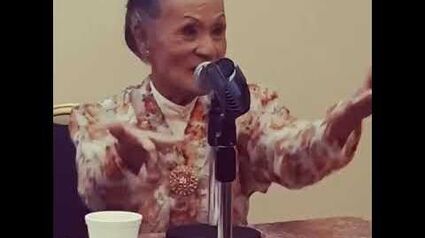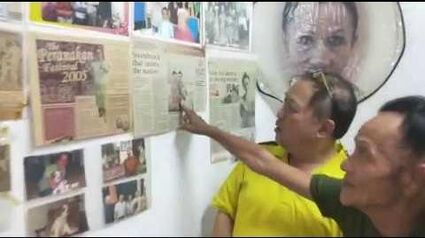Francis Hogan (born 1936) is a Eurasian and well-known female impersonator in Wayang Peranakan (Peranakan theatre) which experienced a revival in the 1950s. He is still actively performing today, thereby earning him the distinction of having an acting career which spans almost 70 years.
Hogan has compiled an album containing photographs which document the important people and acting moments in his life. The latter include his performances in some landmark plays, such as Janda Kaya (The Wealthy Widow), alongside other well-known actors such as William Tan and Ong Chwee Kim.
Wayang Peranakan is an example of the hybrid nature of Peranakan culture as it derives from an eclectic blend of Chinese Wayang and Malaya Bangsawan. It is commonly staged in the Baba patois and its origins can be traced to the early 20th century.
On 20 March 2019, Hogan, then 83, delivered a talk at the Peranakan Museum with artist Sherman Ong. It was entitled, Si Pungguk Rindukan Bulan (The Owl Pines for the Moon) and reflected on their recent photo project of the same name. Ong captured Hogan making up, dressing in a traditional Nyonya camisole and kemban, playing the dually gendered roles of patriarch and patriarch amidst vintage furniture, and then undressing - evoking the longing that matriarchs had for their husbands who had gone off with their minor wives and mistresses: the pining of a tiny owl for the moon.

Francis Hogan - iconic Peranakan female impersonator
Video by Ng Yi-Sheng
Hogan explained that he had begun the practice in the 1950s, when tragedies were common, and had scripted dramas about abused stepdaughters, turning on and off his tears like a tap. In the 2010s, as comedy was more popular, he was brought back into the scene in 2002 with Bibiks Behind Bars, about elderly gambling addicts. People had called him Bibik Tok Yu (Bibik Soya Sauce) back then, but he did not like that; he preferred the nickname Bibik Dondang Sayang, because of the pantun he loved to sing.
After the talk, Hogan was asked by writer Ng Yi-Sheng if there was a gay community in 1950s Peranakan theatre. Yes, he said, but they did not talk about it. Regarding gender, what pronouns did he prefer? Anything, he said. Neighbours in the void deck called him auntie; his friends think of him as male. He had been genderfluid before the term came into general use.
On 17 December 2019, Hogan was interviewed by Ivan Tan at the Baba House along Neil Road[1]:

Francis Hogan interviewed by Ivan Tan, 17 December 2019
See also[]
References[]
- "Album of Francis Hogan – Francis Hogan in sarong kebaya", Roots[2].
- Daphne Ong, "Peranakan pleasures", Singapore's essential arts & culture guide, 27 October 2015[3].
Acknowledgements[]
This article was written by Roy Tan.